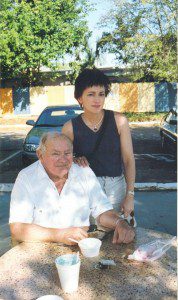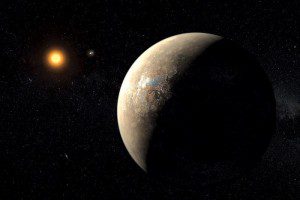My father believed in UFO’s deeply, sincerely. He watched the night skies often, ready for a revelation, for the flashing brilliance of an alien in his backyard. His faith in extraterrestrial life never wavered but his believe in God flickered off and on over his lifetime. Mostly off. He saw the two as mutually exclusive. Alien life, in his mind, proved that God didn’t exist.
 If he were still alive, he’d count this week’s exuberant headlines announcing the discovery, at long last of a “habitable planet” a victory for his side. I would confuse the contest by sharing his excitement. I enjoy watching the night skies almost as much as he did. I follow astronomy news as well as I can. Who does not thrill to the latest news about black holes (one was created in a lab in Haifa this week), Saturday’s near encounter of Venus and Jupiter? Who is not anxious to see the photos from the Juno probe, coming within 2,600 miles of Jupiter’s cloud tops, the closest view ever? And now, this “Proxima B” orbiting our nearest star, harbors possible conditions for life? Glory!
If he were still alive, he’d count this week’s exuberant headlines announcing the discovery, at long last of a “habitable planet” a victory for his side. I would confuse the contest by sharing his excitement. I enjoy watching the night skies almost as much as he did. I follow astronomy news as well as I can. Who does not thrill to the latest news about black holes (one was created in a lab in Haifa this week), Saturday’s near encounter of Venus and Jupiter? Who is not anxious to see the photos from the Juno probe, coming within 2,600 miles of Jupiter’s cloud tops, the closest view ever? And now, this “Proxima B” orbiting our nearest star, harbors possible conditions for life? Glory!
While I’m a sucker for astronomy news, I’m even more intrigued by watching the astronomers who watch the skies. The constant stream of new findings and breakthroughs is announced with such superlatives, the hope and faith of its scientists is palpable, and, often just a little on the charismatic side.
Reporting on the “Epochal Discovery” of Proxima B in the Atlantic Monthly, science reporter Rebecca Boyle writes, “No one will ever find a closer alien world than this. This is it. . . . In the hunt for our cosmic neighbors, this planet is as good as it gets.” (http://theatln.tc/2bgYfIZ) Artist renderings of a planet seen only as a miniscule pale dot through our greatest telescopes show lovely pink and lavender skies, plants with crimson leaves, a veritable potential Eden.
 I’m happy for their joy. There’s been little to celebrate of late, especially for scientists focused on this planet, which isn’t faring too well. How natural to look beyond our borders for another frontier, one as yet unspoiled by our presence. (image YouTube/European Southern Observatory)
I’m happy for their joy. There’s been little to celebrate of late, especially for scientists focused on this planet, which isn’t faring too well. How natural to look beyond our borders for another frontier, one as yet unspoiled by our presence. (image YouTube/European Southern Observatory)
But I think my father would try to clinch the score with one more headline spawned by this discovery, this one on the “Genesis Mission.” While humankind has been eager to discover life on other planets for hundreds of years, some scientists now want to bring life to other planets. In short, the biblical sounding project is the brain child of Claudius Gros, a systems theorist in Frankfurt Germany, who suggests in a just-published paper in the Institute for Theoretical Physics (http://arxiv.org/pdf/1608.06087.pdf) that we “seed” these inhabitable planets to jump-start their steps toward Life. He proposes that scientists send off probes to implant planet surfaces with tiny capsules of plant and animal microbes specially designed to trim 4 billion years off the evolutionary process. Ross Anderson, science writer for the Atlantic, gushes, “A successful probe would allow a planet to . . . move quickly toward a lush biosphere capable of spawning intelligent life. We could send these probes to thousands of local planets, and wait a few hundred million years. By that time, our corner of the galaxy might be the envy of the cosmos.” (http://theatln.tc/2bphWBa)
 But Gros acknowledges the difficulties. It will take the probe a few hundred to a few thousands years to simply arrive at the targeted planets. Not to mention then the millions of years to crawl through the necessary evolutionary steps to produce intelligent life. Why do this, then? What’s the point? Gros’ response is fascinating: (image/ESO/M. Kornmesser)
But Gros acknowledges the difficulties. It will take the probe a few hundred to a few thousands years to simply arrive at the targeted planets. Not to mention then the millions of years to crawl through the necessary evolutionary steps to produce intelligent life. Why do this, then? What’s the point? Gros’ response is fascinating: (image/ESO/M. Kornmesser)
If we take the stance that a rational action is one which benefits ourselves, or society, or humanity, then there is no explicit rationale for a Genesis mission. For me, personally, it is a question of aesthetics. Life is something beautiful, and giving life the possibility to blossom elsewhere in the universe would be wonderful.
With its biblical language, and its out-of-this-world hubristic hopes and projections, it’s easy to see the imprint of the Fall all over again: we the creatures deny our creator and take His place as the makers and bringers of life—Life!—to other worlds. And maybe this is true. But I see something more in Gros’ words. This desire makes no rational sense, as he confessed, but more, it doesn’t even make evolutionary sense. This is not how evolution works: to sacrifice uncountable amounts of money, time and expertise over thousands, millions of years—for the express purpose of bringing the blossom and beauty of life to planets we will never see or benefit from? But this makes human sense. More, this makes Genesis sense and image-of-God sense, for this is just the kind of creatures God created us to be. Out of soil he formed us, and he placed us in a garden to dress and guard it, to bring beauty, blossom, food and life from the ground we ourselves were made from, that all creatures and the earth itself would flourish under our loving care.
We’ve failed miserably in the “creation mandate” our Creator gave to us. Gros’ desire to plant life and beauty throughout the cosmos is shot through with this same hope: “A Genesis mission is meant to give life the possibility to flourish,” he says. Perhaps he wants another chance. Who doesn’t? I thoroughly admire such selfish, holy ambition, but I’d like to stick with this world and see what can be done here first before we rocket off to other worlds.
I wish I could say all this to my father, who I kept hoping would yet believe in God. And he kept hoping I would believe in aliens. I don’t think I played it right in his last days. The discovery of life on another planet wouldn’t shake my faith; it would only strengthen what I already know of God: that He is endlessly creative, endlessly loving with plans and purposes far beyond even our wildest science fiction imaginations.
In my father’s last days I finally realized I couldn’t argue him to God and I gave up trying. If I could rewrite the painful ending, I’d have us standing out under the bright night sky together, watching for falling stars and spaceships, silently sharing in the starry glory my father could not name, but loved.











